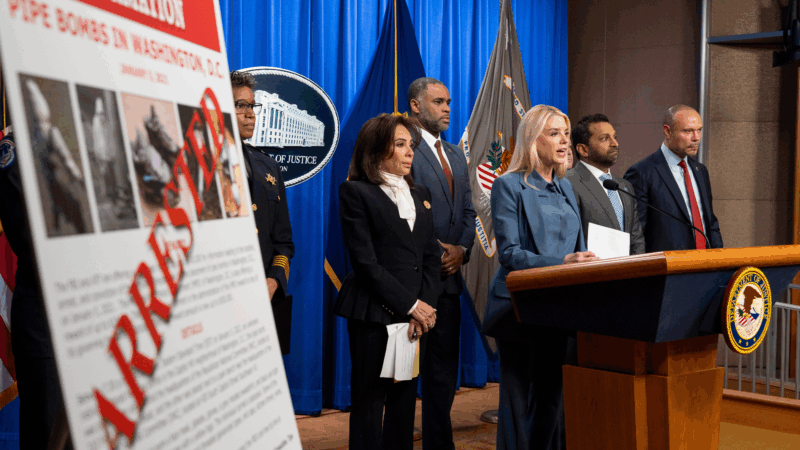Sewer Overflows Persist Despite Billions Spent
Every few weeks, Nelson Brooke drives through Jefferson County to check on the spots where the sewer overflows. Brooke is the head of the environmental group Black Warrior Riverkeeper.
At a stop, ten blocks west of downtown Birmingham, Brooke checks on Valley Creek. The water should be clear, but on this day, it looks more like broccoli soup.
“That kind of green-grey, milky cloudiness is a very common thing when you have sewage in water,” Brooke said.
He says it’s been this way for more than a decade. County officials say they don’t know where the sewage is coming from.
Later on his patrol, Brooke knocks on doors to see if residents know of sewage problems in their neighborhoods. Across the street, a young man calls out to ask if Brooke is lost.
“Do you know about sewer overflows?” Brooke asks the man. “Where sewage is coming out of manholes?”
Michael Alexander points to a slope in the street. “That’s right here,” he said. “When it rains on this street [sewage] comes out here here and here.”
Alexander, 37, has lived on this block since he was a kid. He says for nearly 30 years the sewer has been overflowing into the street.
“Every time it rains, the sewage comes up out of there and you can’t walk across [the road],” Alexander said. “You splash your car through there, you are going to have crap on your [tires]. You might have a tampon hanging off.”
Alexander makes a face. “The smell is terrible,” he said. “It’s like that for two blocks.”
Alexander says he and his neighbors have just learned to live with it.
A Long Running Problem
In 1993 local environmental groups sued Jefferson County which resulted in the Environmental Protection Agency, issuing a consent decree, requiring Jefferson County to comply with the Clean Water Act and stop dumping raw sewage into local rivers and streams. To fix the sewer problems, the county spent over three billion dollars. Except some of the money wasn’t spent on the sewers, it became embroiled in a corruption scandal that led to the county filing for bankruptcy in 2011. At the time it was largest municipal bankruptcy in U.S. history.
In some neighborhoods, sewer overflows continue today.
“Why did you not fix the sewer, when we gave you all of that billions of dollars?” said Shelia Tyson, a Birmingham city councilwoman for the neighborhoods where many of the sewer overflows occur.
Tyson says residents have complained to her of sewage backed up in their yards. They report bad smells, asthma, and skin rashes. Tyson worries raw sewage leaks are causing health problems and that public officials don’t seem to care.
“You know why? It hasn’t hit home yet. It hasn’t affected people with money,” Tyson said. “This is a poor person’s issue. It’s not in their community.”
The County’s Response
Director of Environmental Services for Jefferson County David Dennard says it’s not completely the county’s fault.
“Really all of the issues where we are having these recurring overflow areas happen in former municipal systems,” Dennard said. He explains the county took over Birmingham and other cities’ sewer systems, and as a result, it’s been playing catch-up with these overflows.
Dennard says the county has checked off two-thirds of the EPA’s orders in the consent decree and fixed 99 percent of the sewage overflows.
Dan Biles, Deputy County Manager for Infrastructure, says they fixed the biggest problems first, such as sewage flowing into the Cahaba Riiver. He says It’s not because it’s in a wealthier neighborhood, but because the problem was bigger.
“It doesn’t matter where it is, wherever [we] can spend the dollar to get the best bang for our buck,” Biles said. “Whether it’s Lincoln Ave or Fifth Ave or wherever, it’s about reducing [overflows] and making the most impact.”
Dennard has acknowledged that sewage has overflowed into the streets and creeks of southwest Birmingham for years, so that’s where they are focusing their work.
Right now, a pyramid of pipes and a pile of gravel wait on the side of that street where Michael Alexander lives, suggesting that for the first time in the three decades that he’s lived there, the sewer problem might be fixed.
Pipe bomb suspect told FBI he targeted U.S. political parties, memo says
The man accused of placing two pipe bombs in Washington on the eve of Jan. 6, 2021 told investigators someone needed to "speak up" for people who believed the 2020 election was stolen, prosecutors said Sunday.
Chinese military stages drills around Taiwan to warn ‘external forces’
The drills came after Beijing expressed anger at U.S. arms sales, and a statement by Japan's prime minister saying its military could get involved if China were to take action against Taiwan.
Trump and Netanyahu to meet in Florida at a crucial moment for the Gaza ceasefire
President Trump could use the face-to-face at his Mar-a-Lago estate to look for ways to speed up the peace process, as Israel's leader has been accused of not pushing his side to move fast enough.
‘Bomb cyclone’ forecasted to bring heavy snow, blizzard conditions and dangerous travel
A 'bomb cyclone' is intensifying severe winter weather for millions of people across the U.S. The system is expected to knock out power and disrupt holiday travel.
Russia sends 3 Iranian satellites into orbit, report says
The report said that a Russian rocket sent the satellites on Sunday from a launchpad in eastern Russia.
Viral global TikToks: A twist on soccer, Tanzania’s Charlie Chaplin, hope in Gaza
TikToks are everywhere (well, except countries like Australia and India, where they've been banned.) We talk to the creators of some of the year's most popular reels from the Global South.







